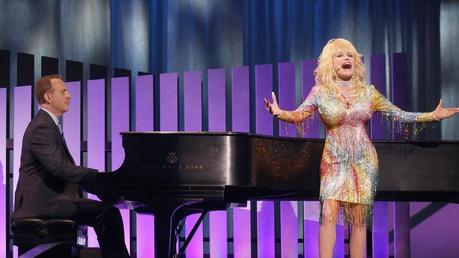It’s that time of year again. This is when the top five broadcast networks do their song and dance in front of Madison Avenue ad people, CBS touting how it’s still #1 in overall viewers, NBC arguing that if you squint hard enough they still might be #1 among adults under the age of 50, ABC pointing out how if you take sports out of the equation they’d actually be tied for first place in the key adult demo, Fox mostly mumbling something about Empire and walking away quietly, and The CW beginning with, “So, about this new DC comic book show…” and ending with “Sure, no one watches Jane the Virgin, but it’s really, really good.”
For us, it’s a chance to mourn the shows on the way out (Forever! Constantine!) and geek out over as well mock some of the new shows (one of them has a modern day Frankenstein in a police procedural!), but for the networks it is the most important time of the year. This is when the ad buyers decide how much advertizing to buy at each network for the upcoming TV season, and we’re talking big money here. According to THR, “The ad buyers will dole out an estimated $9 billion” in overall advertizing at the networks. However, that’s down by as much as 7% from 2014-15.
Can you really blame the advertisers? Just look at the current state of the top five networks: Overall viewership was down an astounding 20% at Fox this year (high-profile ratings bomb Utopia killed their Fall schedule), NBC and CBS both dropped in the 18-49 demo (11% and 4% respectively), and The CW is simply happy that its overall ratings remained flat. ABC and its 5% year-over-year improvement in the 18-49 demo is really the only network which can genuinely brag about growth. Probably not coincidentally, the Cabletelevision Advertising Bureau has reported that “the audience for live TV is dropping at a rate of roughly 10 percent per year as viewers abandon both broadcast and cable networks.”
Not surprisingly, everyone blames streaming, and worries over how to best quantify TV ratings, convinced that Nielsen is under-reporting because it does not track viewing on mobile devices. As I previously explained, Nielsen is like a ruler in world where we now need a microscope. At this point, almost all of the networks don’t even bother with reporting live ratings anymore, favoring Live+3 and Live+7 to emphasize how many people are actually watching their shows instead of lamenting how view people are watching them live. However, due to the time-sensitivity of most ads, the advertizing people don’t so much care if a show is watched more than 3 days after it airs. And that’s how you end up with the run of live network musicals, mountains of cash being thrown at DVR-immune live sports programming, and NBC bizarrely transforming its returning multi-camera sitcom Undateable into a show which will film and broadcast every single episode live.

Bizarre 2015 Upfronts Scene: That’s NBC Entertainment Chairman Bob Greenblatt playing piano for Dolly Parton to announce her first original TV movie
Now, the network execs are parading on a New York stage, working from their prepared talking points, and showing off sizzle reels for all of their new shows (or playing piano while Dolly Parton belts out “I Will Always Love You”), like a habitual cheater trying to convince a repeatedly spurned spouse, “It’ll be different this time, baby, I swear.” Not counting summer or online-only shows, ABC has 10 new shows for 2015/16, CBS has 9, The CW has 3, Fox has 12, and NBC has a staggering 20. But we know it’s not really going to be different. Most TV shows lucky enough to make it on the air are highly unlikely to make it to a second season. Your fate is normally tied to the current health of your network, like how ABC renewed 7 of its 11 2014/15 freshman shows which have already aired (two don’t premiere until this summer, another was canceled before it ever aired), CBS renewed 5 of its 8, and The CW renewed all but 1 of its 4.
See a full run-down of the new, canceled and returning shows at THR.

By the time Empire hit big, it was too late in the pilot process to quickly usher in the inevitable knockoffs, but they’re definitely coming
Things were unsurprisingly less kind at Fox where of its 11 freshman shows only Empire, Gotham and The Last Man on Earth are coming back, although Empire is easily the biggest new hit show on any network. NBC’s ratings turnaround in recent years is largely a Voice/sports-inflated mirage. Unless it’s made by Dick Wolf and has “Chicago” in the title, they simply cannot launch new shows anymore. Of the peacock’s 18 freshman shows, only 1 is returning, The Mysteries of Laura. Unbreakable Kimmy Schmidt should have been on their schedule, but they let the next 30 Rock (which, to be fair, was never a ratings winner) walk out the door to Netflix because they very frankly told Tina Fey they had no idea how to launch comedies anymore and let her shop the show elsewhere.

The new 6-episode season of The X-Files will premiere in January
So, ratings are down, ad people are forking over fewer dollars, and even the network that launched Empire is mostly floundering. The obvious next moves are risk management and alternate revenue streams. That’s why we’re getting so many remakes (an African-American Uncle Buck at ABC), revivals (Heroes Reborn and Coach at NBC, The X-Files at Fox, The Muppets at ABC), adaptations (Limitless and Rush Hour at CBS, Minority Report at Fox), and comic books (Supergirl at CBS, Legends of Tomorrow at The CW, Lucifer at Fox). This is not dissimilar to the way the movie studios have favored sequels, remakes and comic books in recent years as domestic attendance has continued to decline. Those types of movies are easier to sell to international audiences, establishing a new normal in which the domestic box office dollar is not as important. Similarly, TV ratings aren’t quite as important to the networks as they used to be. Instead, as Vulture explained, the networks are into “asset creation” whereby you leverage “the network platform to create shows that bring in revenue from sources other than advertising — sales to international markets, U.S. cable networks, and, increasingly, streaming players such as Netflix or Hulu.”
But asset creation inevitably prioritizes those assets you actually control. To again use a movie analogy, all of the film studios used to both make their own movies and own their own theaters. So, they would play their movies in their theaters, but The Supreme Court made them stop doing that, thinking it unseemly for the studios to control both production and exhibition. Well, now the TV networks are doing something somewhat similar. The four major broadcast networks have their own sister studios which produce TV shows, and The CW, co-owned by Warner Bros. and CBS, is like a farm team for WB-TV and CBS Studios. Back when ratings were amazing and the ad dollar strong it didn’t so much matter if an ABC Studios TV show aired on NBC. Now, corporate synergy is the method of the day, and the networks prefer to only air shows they own.
Alternative revenue streams only kick in if a network has some sort of financial stake in a show. If a series is produced by an outside studio, the network only has one big way to make money from it: selling ad time. That’s fine when a show is a big hit, but with so many series now getting by with modest ratings, broadcasters don’t have any interest in modestly performing shows they can’t fully exploit. That’s why Fox axed Almost Human last season (the show came from Warner Bros. TV) and why ABC pulled the plug on Cristela (which has actually improved ABC’s Friday ratings).
For example, the big success story of the 2014/15 season was ABC, which responded to the sorry state of broadcast television by choosing to embrace the power of Shonda Rhimes (How to Get Away With Murder), commit to being the home of family sitcoms and racially diverse programming (Blackish, Fresh Off the Boat, Cristela), and push a couple of high-quality programs (American Crime). They did so in a cost-effective manner. Of the 2014/15 freshman shows they decided to renew, only Fresh Off the Boat hails from an outside studio, 20th Century Fox Television. All of their 2015/16 shows are ABC Studios productions or co-productions. The same is generally true across the board at all of the networks, with many a promising pilot passed over because it hailed from an outside studio, although there are still a handful of more traditional arrangements where a network has agreed to air a show it doesn’t own, such as Fox running with WB-TV’s Lucifer.
Sources: THR, Vulture

